Introduction
Consumers across the globe are increasingly shifting more of their activity online as COVID-19 has impacted the way individuals interact with brands. As more consumers are growing accustomed to everything from buying groceries, to managing finances and keeping up with friends in the digital world – thus sharing more personal data every minute – privacy has undoubtedly become a greater risk for concern.
With more options than ever regarding user security, consumer patience is running thin. They are no longer willing to tolerate frustrating experiences online when it comes to their data. To stay relevant, brands must race to improve digital experiences and security practices to ensure long term customer loyalty and security.
To better understand consumer behavior and to identify how businesses can improve, Ping Identity surveyed 3,400 consumers1 across five countries and underlined the importance of easy and frictionless online experiences without sacrificing personal privacy. 1 The survey included 3,400 consumers from the United States, the United Kingdom, Germany, France and Australia. I
Key Global Takeaways
- 56% of online consumers have abandoned an online service when logging in was too frustrating. Additionally, 63% of consumers are likely to leave an online service for a competitor who makes it significantly easier to authenticate identity.
- 58% are comfortable with the concept of a digital ID that stores personal information securely on a smartphone to share electronically—including 70% under 40.
- 46% would prefer to use a service or site that offers an alternative to passwords.
- 40% are not able to answer their security questions at least half the time when trying to regain access to an account or resetting a password.
- 85% want to know how online services share their personal information. However, 72% of consumers say it is difficult to find out how their personal information is shared.
- 63% would feel better about a brand that made it easy to see how their personal information was being used—20% would even recommend the brand to others.
- 60% have dropped an account entirely over privacy concerns, including 46% who have done so more than once.
FINDING #1:
Consumers Demand an
Easy and Fast Experience
Consumers are no longer willing to tolerate the frustration of entering a litany of personal information to access online accounts. Many will go so far as abandoning a brand outright to avoid this. With consumers reaching a tipping point, brands need to ensure that authentication processes are frictionless at every stage of the digital experience.
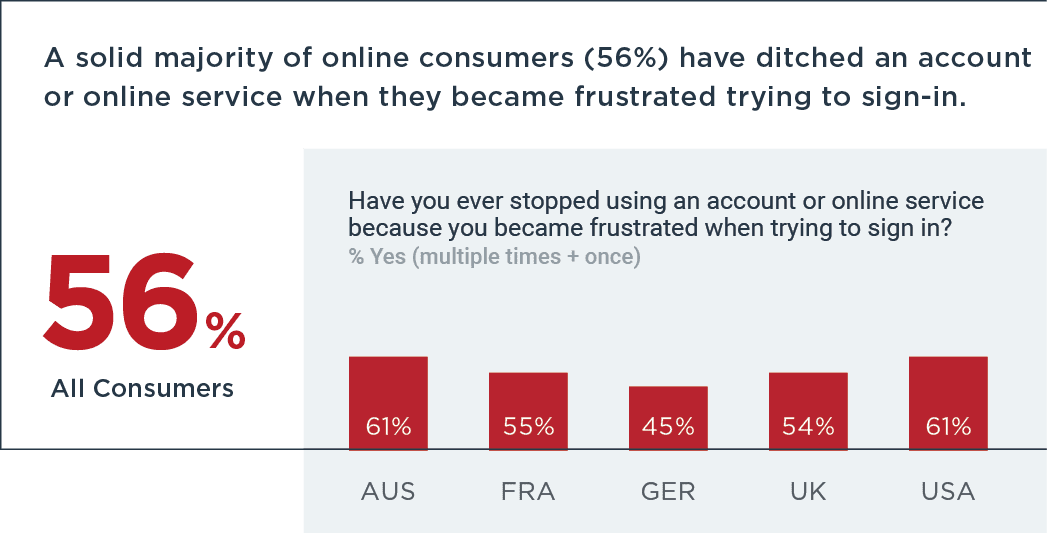
Consumers in Australia and the United States are most likely to drop an online service if frustrated by the sign-in process.
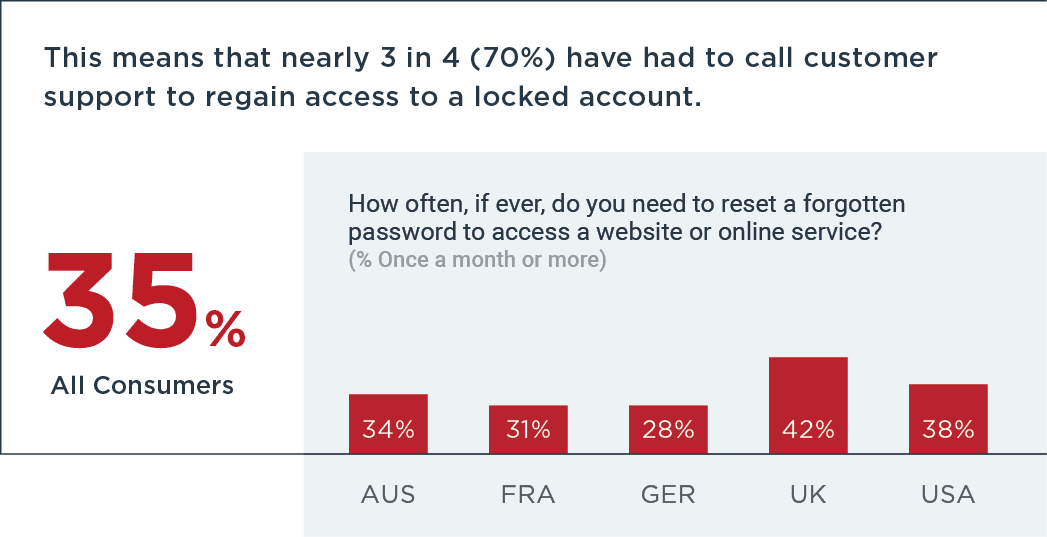
Common inefficiencies include consumers being forced to reset a forgotten password at least once per month (35%), and even more (40%) are unable to answer their security questions at least half the time.
Nearly half of consumers in the United States (48%) forget the answers to their security questions at least half the time. Additionally, U.S. consumers are more likely to call a company to verify their identity: more than three-fourths of consumers in the United States (77%) have done so, compared to 62% of those in Germany and 66% in France.
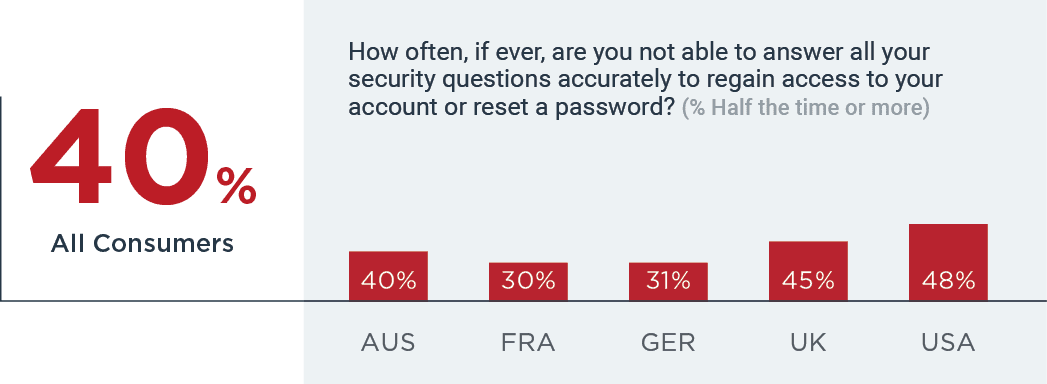
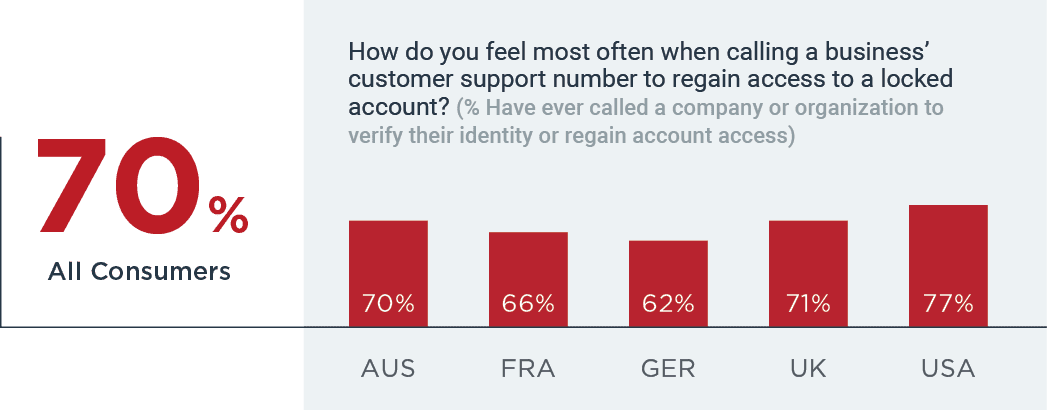
Feelings of frustration when regaining account access can have consequences for brands – half of consumers would take some type of negative action (54%).
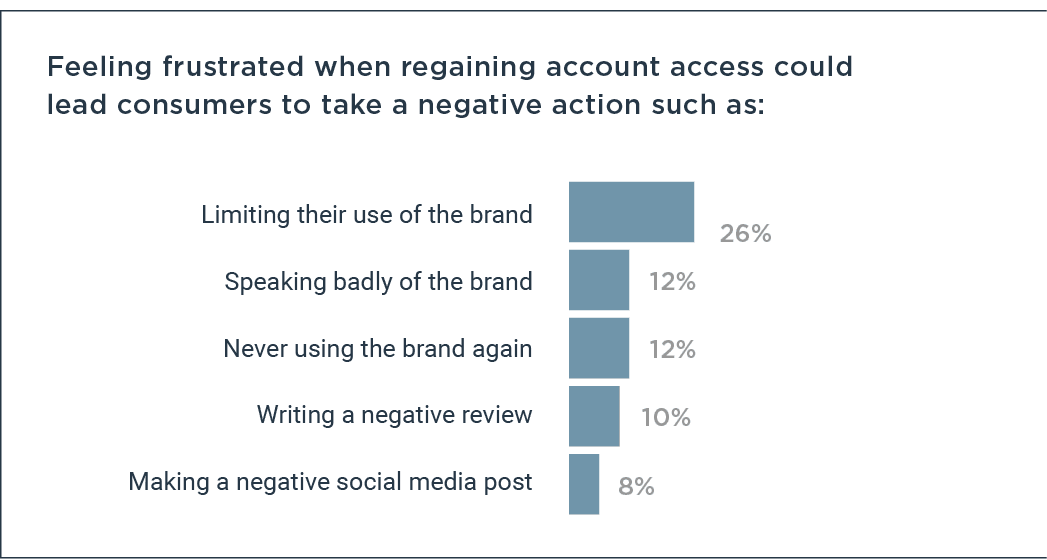
Consumers are attracted to password alternatives, with many preferring services that offer non-traditional login methods. Consumers also want to efficiently input their personal information by spending less than five minutes setting up online accounts – especially when it comes to optional accounts like those for online shopping, entertainment and social media.
Two-thirds of consumers in France say they would take some type of negative action when frustrated trying to regain account access (66%), compared to 54% of all consumers surveyed.
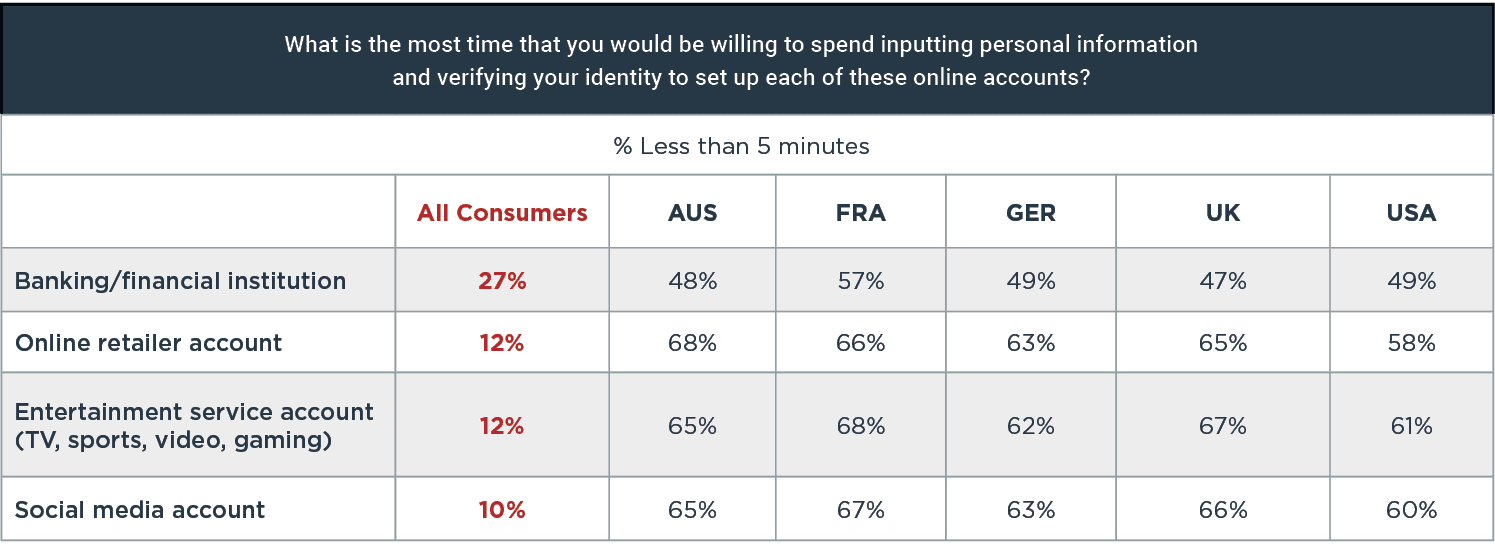
Further, nearly two-thirds of consumers (63%) are likely to leave an online service for a competitor who makes it significantly easier to authenticate their identity.
- This is particularly true among consumers in France – 72% say they are likely to leave an online service for a competitor that makes authentication easier.
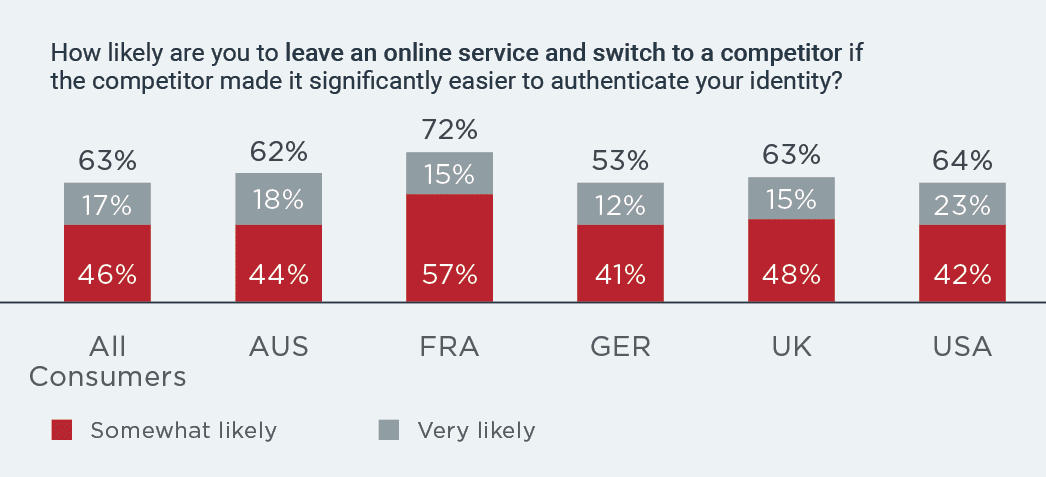
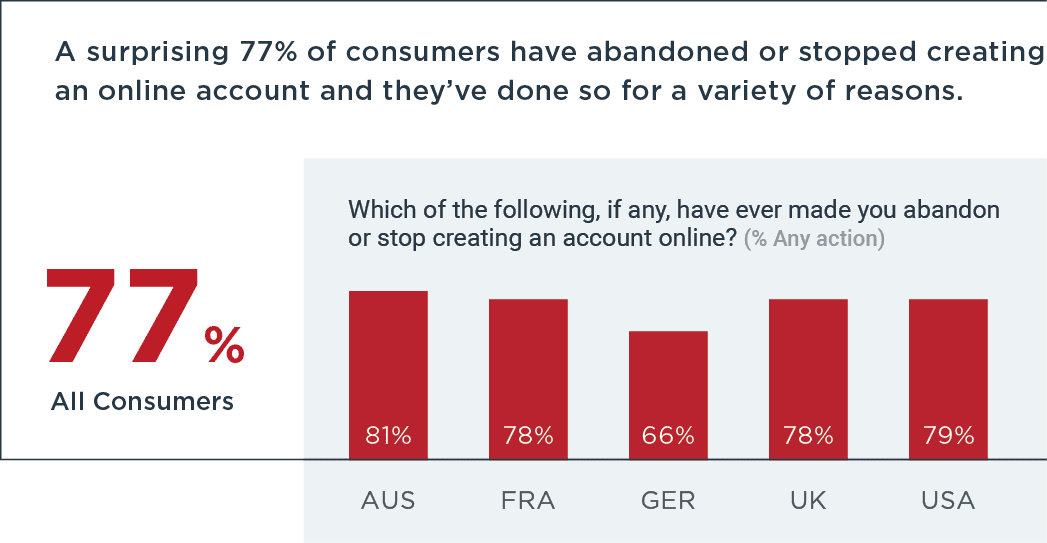
Top reasons to abandon an online account:
40%
Being asked to provide too much personal info
33%
Spending too much time entering information
29%
Requiring too many security steps
FINDING #2:
Consumers Aren’t Taking
Password Security Seriously
Despite heightened privacy concerns, consumers are at potential risk because brands are forcing them to use an authentication method to keep their information safe – strong passwords. Unfortunately, consumers consistently not only struggle with this, but generally prefer a brand that makes password resetting easy.
- When resetting passwords, nearly half (44%) simply make a minor change to an old password or reuse a password from another account.
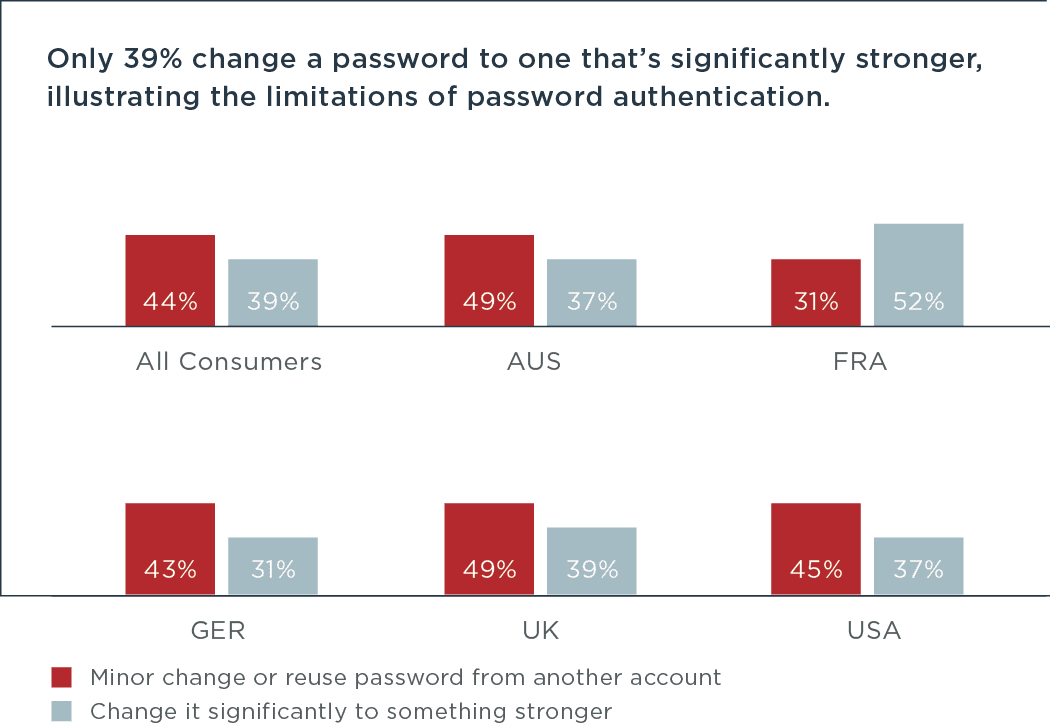
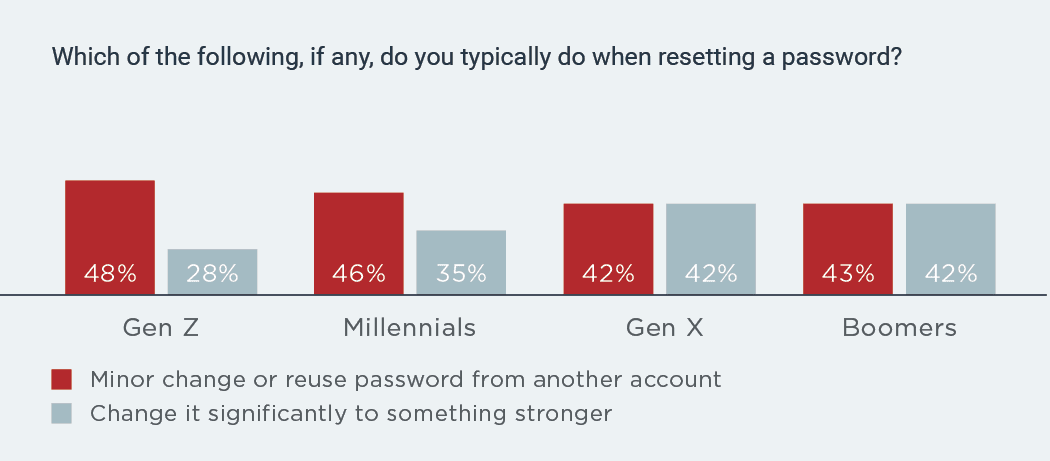
Consumers in France are the most diligent at resetting to strong passwords – half (52%) of French consumers typically change their password to something significantly stronger, compared to only about a third of consumers in other countries.
Younger consumers are especially likely to use weak passwords. Boomers (42%) are most likely to change their password to one that is significantly stronger, while Gen Z consumers (28%) are least likely.
FINDING #3:
Password Alternatives May
Increase Brand Preference
Consumers are more favorable to brands than can make identity authentication easier, specifically those that opt to replace the password requirement with other MFA alternatives.
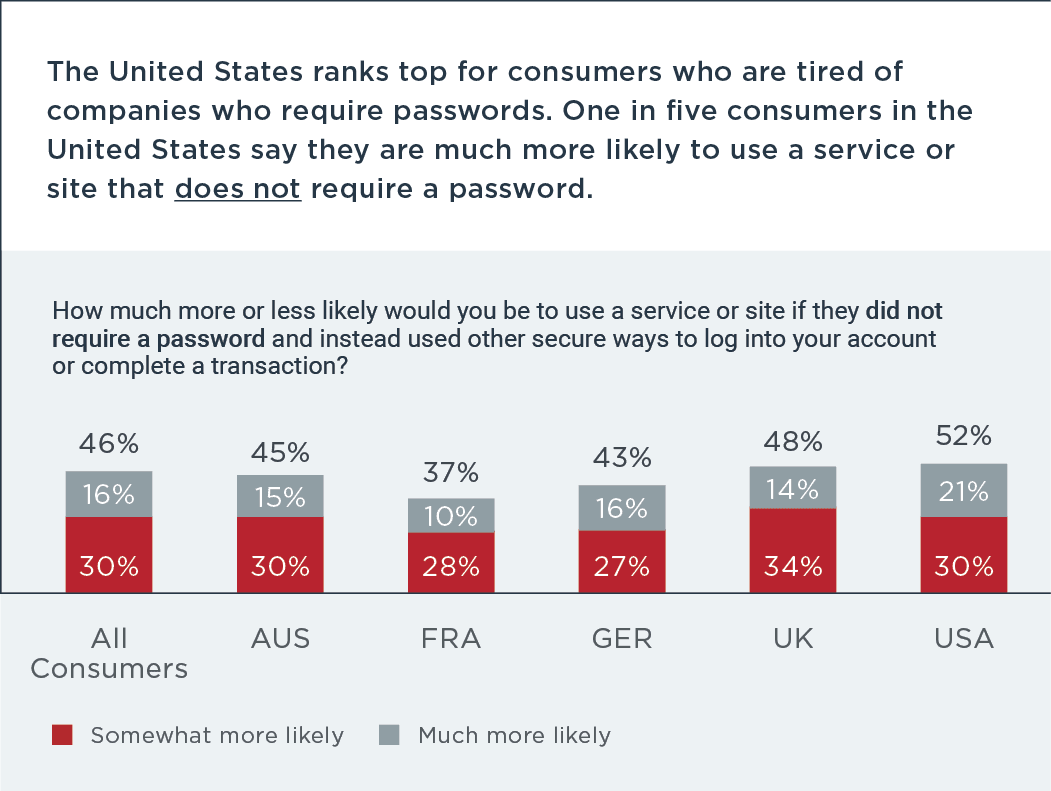
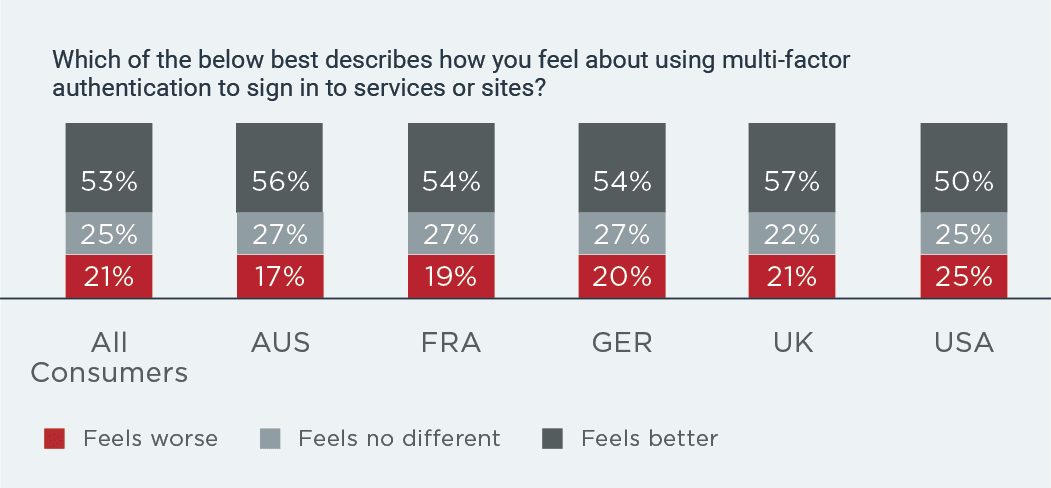
However, consumers are eager for alternative methods of entering personal information, with more than half (58%) comfortable with the idea of a digital ID capability that allows personal information to be stored securely on a mobile device and shared electronically.
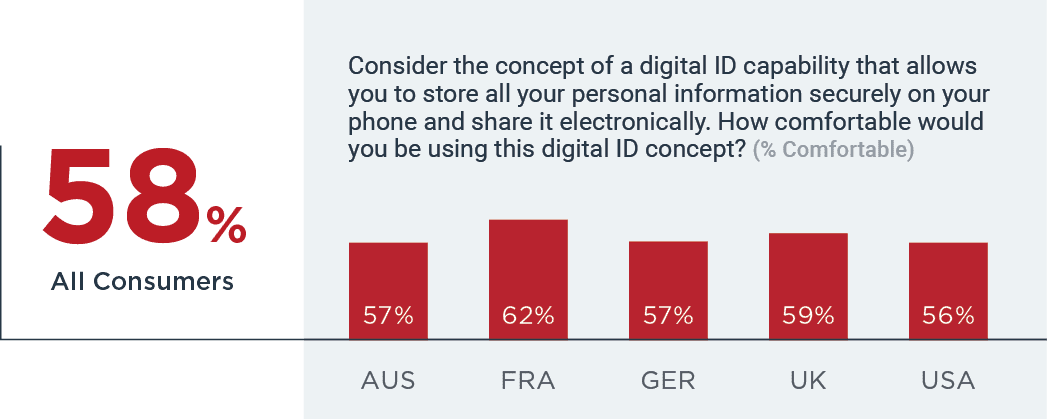
Consumers in the United States are the least receptive to MFA – a quarter say MFA makes them feel worse than passwords..
FINDING #4:
Privacy Control is Imperative
As consumers grow more concerned with how their personal information is being used online, they are increasingly taking a proactive approach to protecting their identity. Therefore, it’s important for users to have the ability to control their privacy by adjusting the privacy settings on their profiles, and it’s also important that updating those settings doesn’t take too much time.
- Over half of consumers (57%) are now reviewing their privacy settings at least half the time when setting up a new account or signing in online.
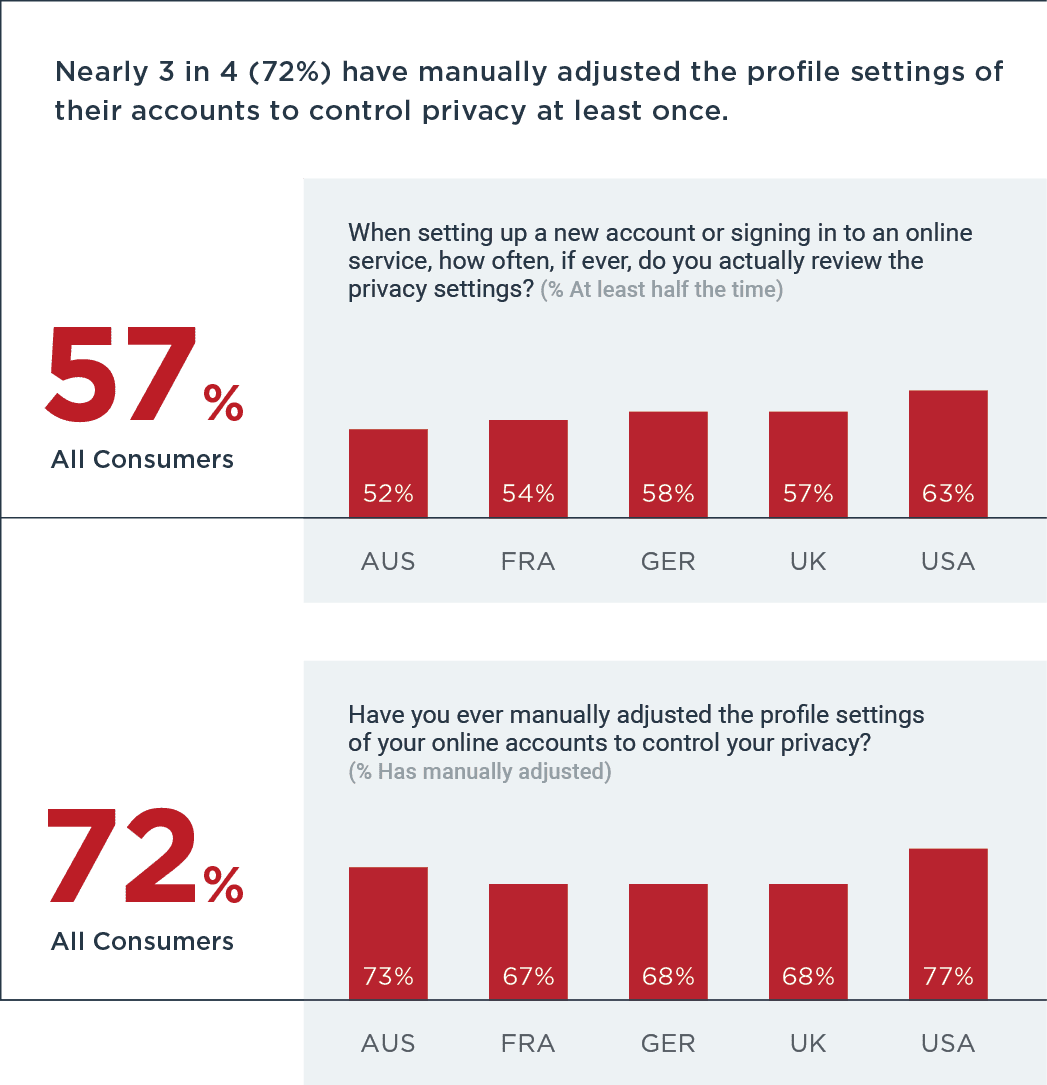
Nearly three-fifths of consumers in the United States regularly review their privacy settings at least half of the time.
All this considered, there are limits on how much time consumers are willing to spend manually adjusting privacy settings. More than three-quarters (76%) expect to spend less than five minutes on a single account, and nearly 2 in 5 (39%) are unwilling to spend even two minutes.
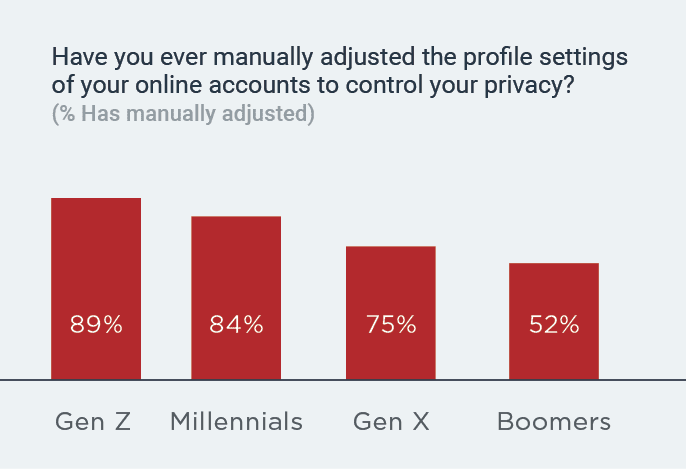
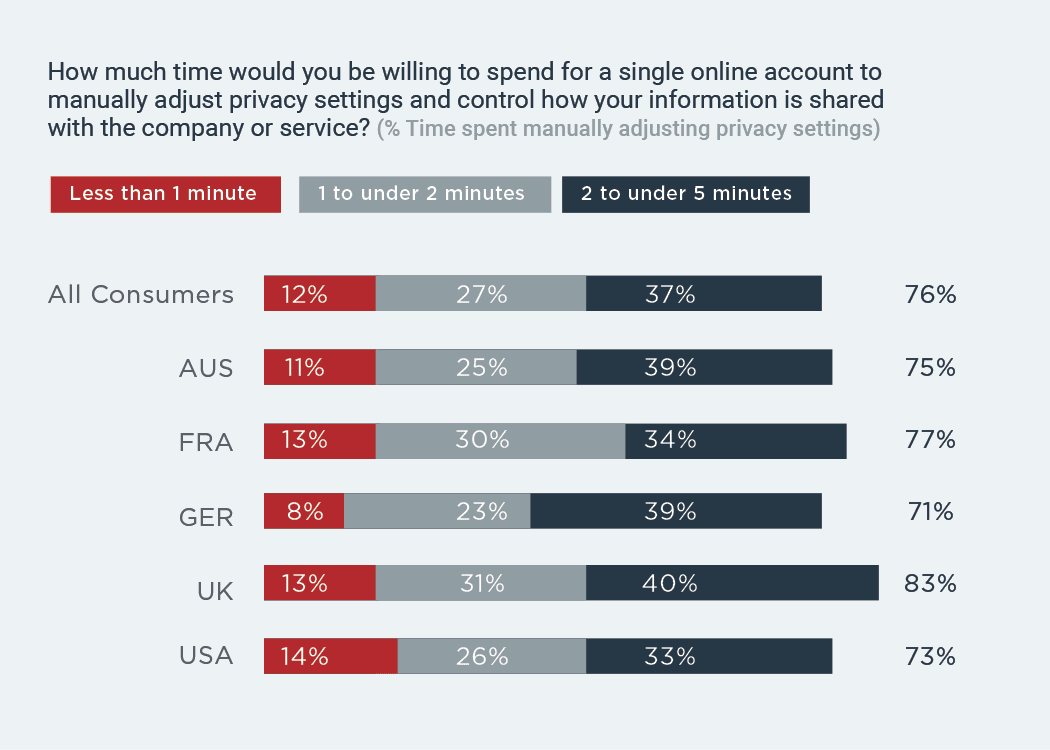
An overwhelming 89% of Gen Zers have manually adjusted their accounts to control privacy, demonstrating that while Gen-Zs may use weak passwords, they are concerned with protecting their information.
FINDING #5:
Transparency Determines Brand Loyalty
Consumers have demanded more transparency about how their information is used, but the list of brands that provide this type of insight is a short one. Most consumers feel better interacting with brands that make it easy to find out how personal information is used.
This means that brands can have a major opportunity to build loyalty and trust by implementing not only frictionless identity management processes, but clear privacy control for their users.
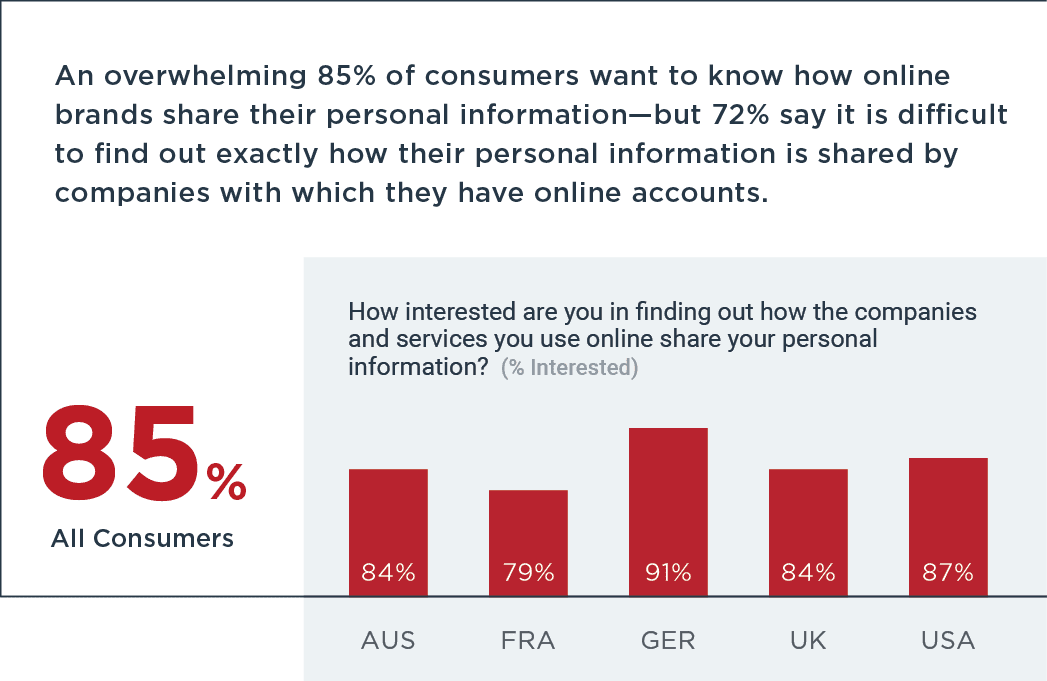
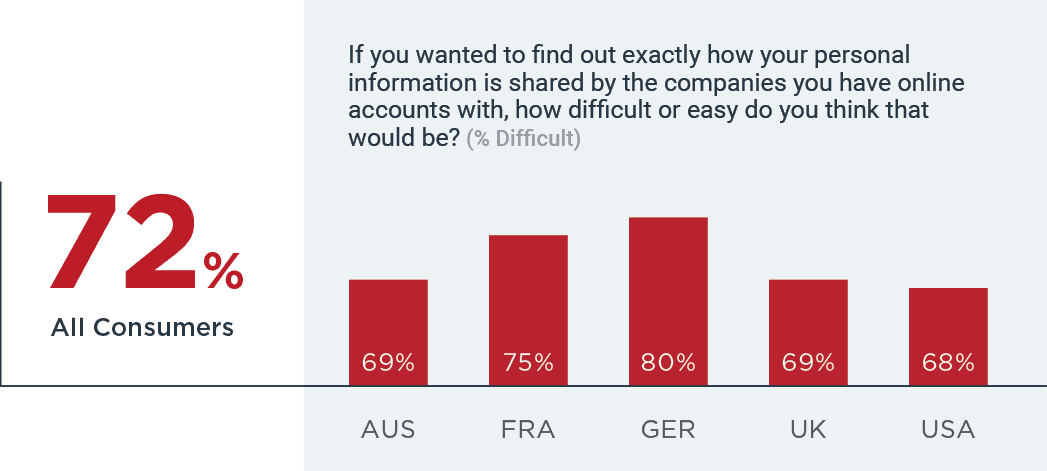
Consumers in Germany are most interested in having insight into how companies share their personal information, with 91% saying they are interested in finding out more, followed by those in the United States (87%).
Consumers in Germany (80%) believe it is difficult to find out how their personal information is shared by companies, compared to 72% of consumers surveyed.
In response, 60% of consumers have gone so far as abandoning an online service because of concerns about how their information is used, including 46% who have done so multiple times.
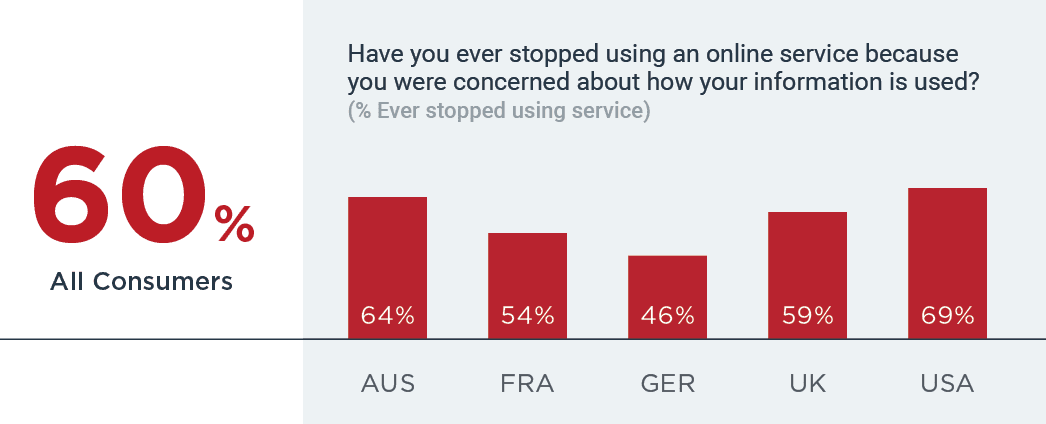
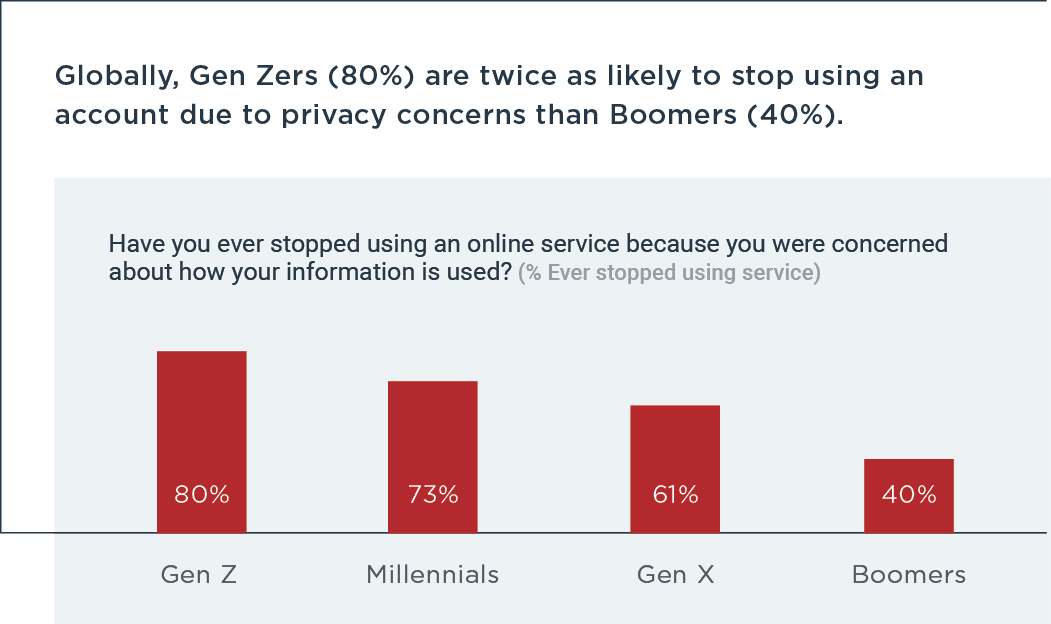
Overall, consumers have a very positive impression of brands that make it easy to find out how personal information is used.
In fact, most (63%) would feel better about a brand that made it easy to find how personal information is being used, with 20% even recommending the brand to others.
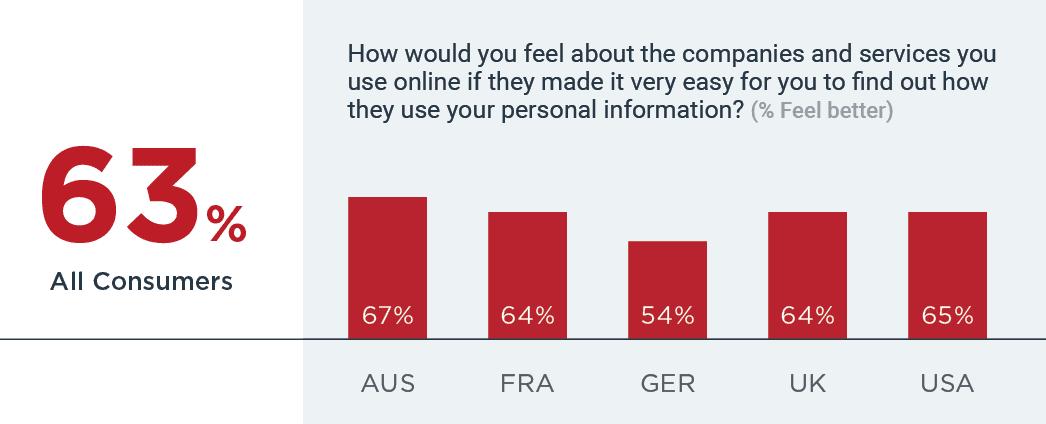
Consumers in the United States are most likely to take action if they are concerned about their privacy. Nearly seven in ten (69%) have stopped using an online service because of privacy concerns.
Conclusion
As consumers become more impatient with excess friction and more aware of how their personal information is being mishandled by brands, it’s never been more critical for companies to deliver seamless experiences that also prioritize privacy and security.
To earn long-term customer loyalty, businesses must consider the following to stay competitive:
- Make the registration and login process easy and fast.
- Offer more secure password alternatives like MFA and digital IDs.
- Be transparent about privacy, or better yet, empower users with access to their own data.
To learn more about how your business can deliver a more seamless customer experience online while strengthening security, download the Ultimate Guide to Customer IAM.
Methodology
Ping Identity surveyed global consumers to better understand experience with authentication processes, attitudes toward online privacy and use of personal information, and willingness to share personal information.
Ping Identity commissioned Wakefield Research to conduct a survey among 3,400 consumers who are engaging with brands online in the following markets: United States, United Kingdom, Australia, France, Germany, between June 22nd and July 7th, 2021, using an email invitation and an online survey.
The geographic breakdown of survey respondents is as follows:
- United States: n=1,000
- United Kingdom: n=600
- Australia: n=600
- France: n=600
- Germany: n=600
The data has been weighted to ensure accurate representation of the consumer population in each market.
Ping Identity envisions a digital world powered by intelligent identity. We help enterprises achieve Zero Trust identity-defined security and more personalized, streamlined user experiences. The Ping Intelligent Identity Platform provides customers, employees and partners with access to cloud, mobile, SaaS and on-premises applications and APIs, while also managing identity and profile data at scale. Over half of the Fortune 100 choose us for our identity expertise, open standards leadership, and partnership with companies including Microsoft, Amazon and Google. We provide flexible options to extend hybrid IT environments and accelerate digital business initiatives with multi-factor authentication, single sign-on, access management, intelligent API security, directory and data governance capabilities. Visit www.pingidentity.com.
Copyright ©2021 Ping Identity Corporation. All rights reserved. Ping Identity, PingFederate, PingOne, PingAccess, PingID, their respective product marks, the Ping Identity trademark logo, and IDENTIFY are trademarks, or servicemarks of Ping Identity Corporation. All other product and service names mentioned are the trademarks of their respective companies.
Start Today
See how Ping can help you deliver secure employee and customer experiences in a rapidly evolving digital world.
Request a free demo
Thank you! Keep an eye on your inbox. We’ll be in touch soon.